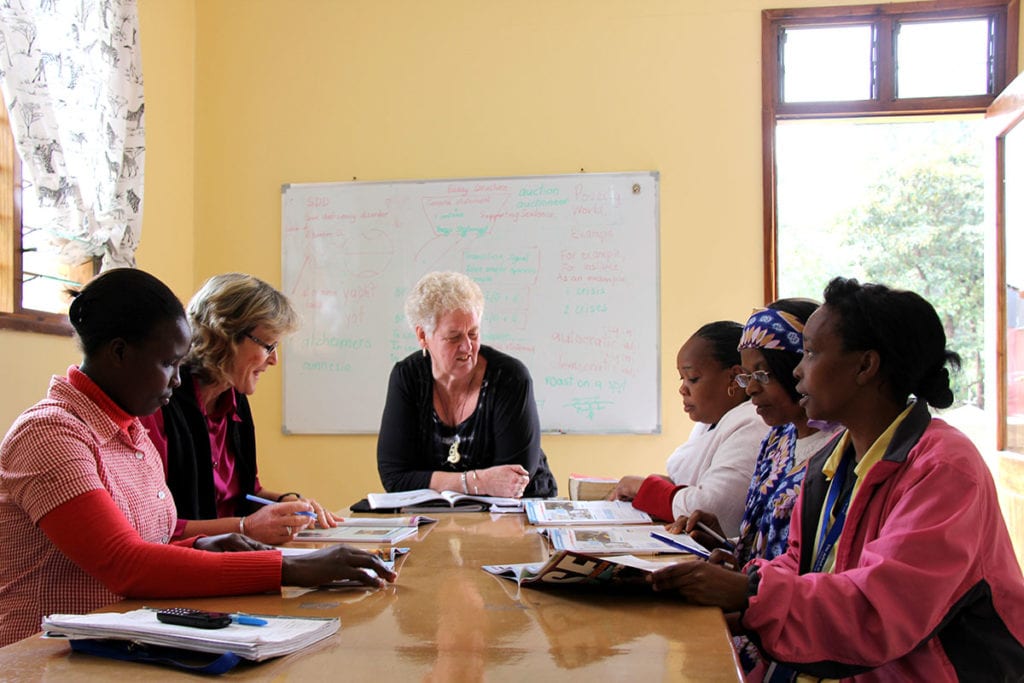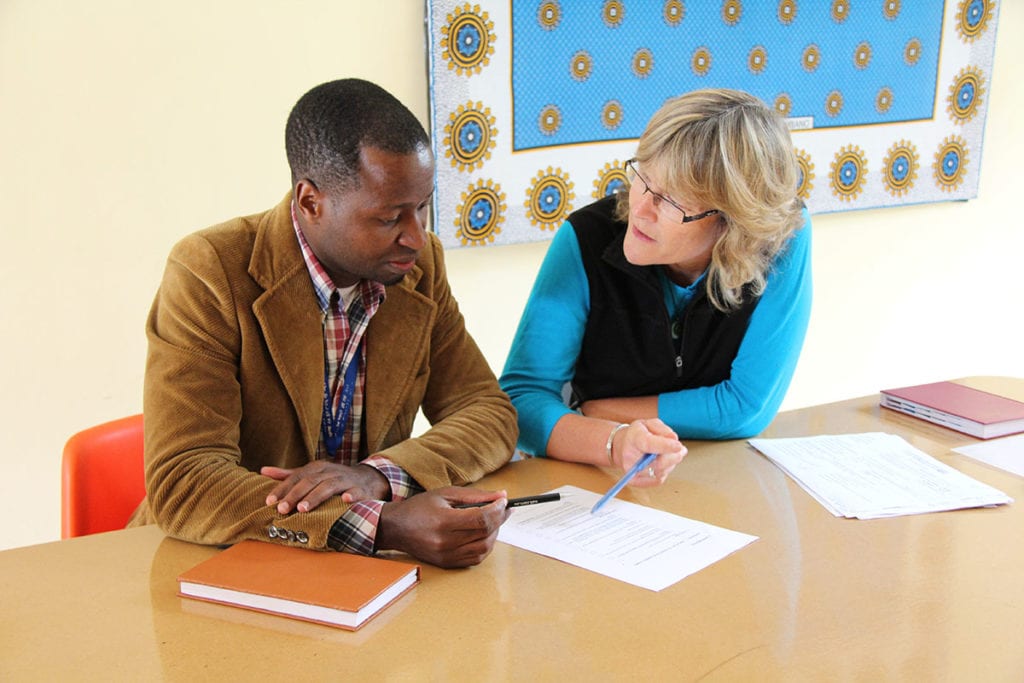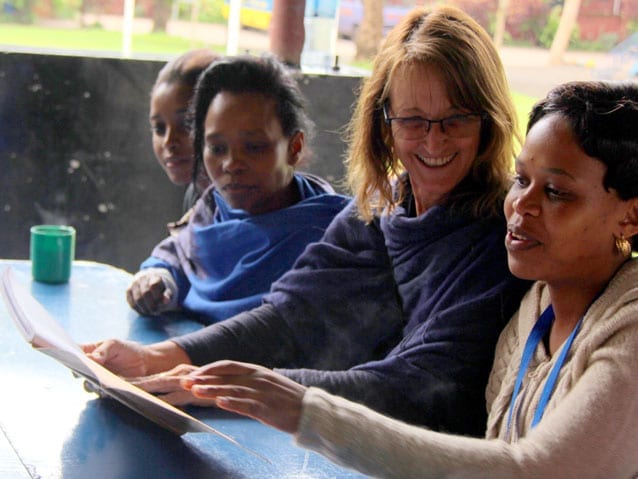If you’re a teacher looking for an exciting new job, experience living abroad, and the chance to give back, then you could be one of the next Teacher Mentors at The School of St. Jude.
In this interview, Gaye Tiplady, a St Jude’s Leadership Mentor with over 25 years of education experience, explains what it’s like to work at the school, live in Arusha, and help make a difference in the lives of hundreds of students.
Why did you decide to decide to come to The School of St Jude’s?
I actually wasn’t looking for a new job. I just glanced at a newspaper and saw the Teacher Mentor position advertised. In the past, I’d worked overseas in corporate, for-profit schools that were all about making money and that just wasn't for me. I was drawn to St Jude’s mission to help disadvantaged children in the region. Ultimately, that mission was the reason I decided to take the position. I wanted to experience something different and I wanted to give back to those who needed it the most.
What is it like to work as a teacher mentor?
Some teachers are nervous coming to the school to work in a mentor role because they don’t have experience in a senior position or working with other teachers. Don’t be! You have nothing to fear and so much to offer.
Any good teacher can easily and effectively work as a mentor. Teachers have communication skills and an education background that is invaluable to the local staff here. This program gives local teachers a chance to work with and learn from mentors who have a different background in education.

Mentors spend the day with local teachers during their planning sessions. We help them find resources and figure out creative ways to implement them in the classroom. But, more than anything, we are a sounding board for the teachers and respond to whatever needs they might have. Rather than try to implement what we think should be done or changed, we provide solutions to problems they bring up.

Working as a teacher mentor has been amazing (not only in content, but in our ability to make an impact). If I worked in a classroom, I could help that class of students. But, as a mentor, I get to work with 10 teachers who teach 25 students each, which means I can help 250 people!
Why do you think a year commitment is important for this position?
I’m so glad the contract has a year minimum. It can take some time to build trust and confidence with the teachers. They’re used to seeing people come and go and things continually changing from person to person. A longer commitment provides continuity and gives us the opportunity to become trusted resources they feel comfortable approaching for help.
What is it like to live in Arusha and at St Jude’s?
I’ve lived on St Jude’s campus for two years and it has been wonderful. We almost always have water, electricity, and internet, and the accommodation is lovely.
When I first moved to Arusha, I didn’t have culture shock at all. The city has a sort of organized chaos that I really enjoy. Over all, it’s an easy place to live and work. I thought I’d end up eating rice and beans every day, but there are so many nice restaurants and places to go out that offer a variety of food.
I’ve been invited to weddings, taken Swahili lessons, and attend drumming lessons on Friday nights. So, while many comforts from home are available, there are also so many opportunities to experience and learn about the local culture.
Have there been any surprises during your time here?
The surprises have all been good! The school is much more organized and established than I thought it would be. The students, compared to others I’ve taught, are easy to manage and eager to learn.
As a mentor, you can get so much out of this experience, but also have so much to give. We all come from different backgrounds and experiences, so hopefully we can have some positive influence on the people here.
Gemma! I saw Gemma speak in 2005 in Armidale and her passion, drive and vision for this project inspired me. I wanted to be a part of helping her achieve her goals, so when the opportunity arose in 2011, the time was right for me and I jumped at the chance.
I have worked in early childhood education for 28 years.The range of experience within this education area has been vast; from working directly with children, to educating teachers at TAFE & university for early childhood teaching degrees; from owning and managing early childhood services to consulting and training for state and commonwealth funded associations to implement new government initiatives in the Early childhood field.
I have been at St Jude’s since September 2011. I feel it is extremely important to be able to develop relationships and understandings over time and to offer consistent and ongoing support to school staff as they strive to develop their skills.
The best thing is the joy I feel when witnessing teachers and staff grow and develop their skills and understanding and I see them working hard towards improving the education of the children at this school. This has a domino affect first on the children, then their families, then the community!

Do it!! But remember effective change takes 20 years, the school is only in its 11th year. Be happy to play a small part (in the time you are here) in a long term vision for fighting poverty through education!
As the story goes, St Jude's started in 2002 with just three students, two classrooms and one volunteer teacher who packed up her bags for Tanzania, to help with a project that was barely off the ground. That volunteer, fresh out of university, was Angela Bailey, who would leave an indelible mark on the school during her three years in Moshono. Angela recently returned to attend our annual St Jude's Day, and we were able to catch up with her to ask about her experiences and what it's like to see The School of St Jude in its present form. Below is the transcript from the interview.
St Jude's: Let’s start by giving us some background of yourself and how you got started with the school, why you came here and how you heard about it.
Angela Bailey: When I was in Year 12 I used to go to the same school that Gemma went to ten years before me and so we had a group of inspirational women speakers and Gemma was one of them. At that point she was running a charity that helped with kids going to government schools in Uganda and Tanzania. So she was running a tour group. I came for a five-week trip with her and seven other people. When we came to Moshono, this was just a plot of land with maize on it. She said she was going to start a school so I said, right, I’ve always wanted to work with kids. This was ’99-’00, sort of Christmas and New Years period. So I went home and did my diploma in children’s services for 18 months and then worked seven days a week and six nights a week just trying to save up some money. I was over here on New Years Eve 2001. That’s how it all started.
SJ: How was that being in Tanzania on New Years Eve?
AB: We went to a wedding for one of Gemma and Richard’s friends. I was exhausted, you know how the trip is. I didn’t arrive until the afternoon and then we went to this wedding in the church that went on for hours. I think it was midnight when we were in the car or something. It was all a blur.
SJ: You didn’t speak any of the language at that point, right?
AB: No.
SJ: Are you fluent now?
AB: I was pretty fluent, but it’s been five years since I’ve spoken it. I still remember quite a bit which is great.
SJ: How many times have you been back now?
AB: This will be the fourth. I left in January ’05. Then I brought back two tour groups, one in 2005 and one in 2006, just so that I could get back. The following time I came which was five years ago, I just came on my own.
SJ: Obviously this place has been growing incredibly quickly. For people who have visited the school, every time they come back there’s something new, so for you to be there from the start and to see all of this, what are your thoughts?
AB: It’s hard to put into words, to be honest with you. I just walked around my first day back and it was very emotional with tears. You see it in pictures and stuff like that but it’s hard. To be honest it’s hard to put into words. I’m really amazed and proud of how well the team has done and I think all the students are amazing. They’re becoming young adults now, all the children I taught.
SJ: Did those kids remember you after all these years?
AB: When they were kids and I’d come back they’d run up to me, but now they’re teenagers. They kind of saunter over and give me the cool hand shake and stuff like that. I got a lot of funny looks when I was first over at Usa (Smith Secondary campus), a few double-takes and stuff like that. Once word spread out, everybody’s been coming up and saying hello.
SJ: So you were at the school for three years. Did you ever expect it to get this big or what were your expectations for the school?
AB: When I came over we were still painting classrooms. Gemma had Nathaniel, who was three months old in a bassinet, she was bouncing him with one leg and painting the wall with another. She told me that ideally, the dream for the school was to have two classes of each level and having a foreigner in one and a Tanzanian in the other. Just two classes all the way up to Form 6. That was her idea and never ever did we think it would get this big.
SJ: Has that been the most surprising thing or what has?
AB: Just the whole structure of it, even just the teams that are in here and the offices. I guess the professionalism of it now because we all just used to do a little bit of everything, but now there are teams that do everything. All of the organization is the most impressive, along with the school boards and the parent boards.
SJ: It’s hard to single out a favorite memory, but if you had to choose one thing off the top of your head what would it be?
AB: The first thing is, only because I went to look at Lucumai’s (a guard) place, and one of the other guards, they were becoming elders. They invited me out to their village and they wanted me to take photos of them for the ceremony. That was a huge privilege. I guess being invited into their homes and getting to know their families. And because there were so few kids and a lot of them lived around the area, I was able to get to know them. Even by the end, I knew most of the students and their families and their backgrounds. I guess being welcomed into their culture as much as I could. It’s hard to pinpoint a moment. We used to tell the story a lot about Eric, who is now in Form 3. It was at the point we were struggling to get good kids that fitted the criteria. If a child passed all areas then they had to find somebody else who could pass all areas before they could start schools. And he couldn’t. He couldn’t find somebody else who passed all the categories. So, he just used to sit out the front of the office everyday. He just gradually learned English by listening to people in the office and the other kids walking past. One day he came up to me and just spoke to me in English, broken English, but he said “Ms Angela, I can’t come and wait here tomorrow.” After a while, with his persistence, we just put him into class and within a month he had caught up with all the other kids in the English. He was just so eager to learn. But there’s lots of little stories like that with the kids and how they got in.
SJ: When you come back and see Gemma and Kim what’s it like?
AB: I catch up with them when they come to Australia for the tours and I’m always asking a million questions. I think being back here is bringing back all the memories for us. Whenever I catch up with Gemma it’s like it was yesterday and take off where we left. I lived with Gemma for the first year and I’m the Godmother of Jacob – her kids are like my nephews. It’s good to see we can just continue on, even though it’s a long time in-between.
SJ: When you left in 2005, what did you go on to do?
AB: I went to go and study my degree so I went back to university. It was really tough going back after three years and especially teaching kids who just don’t take education for granted and wanted to be at school. That was a bit tough. I’ve continued working with kids. I was in Vietnam working with kids last year and working in Sydney running children’s services.
In early 2015, our oldest students – currently in Form 4 – will be graduating from The School of St Jude. They’ll be our inaugural graduating class from our Smith secondary school.
It’s almost unfathomable to consider this prospect and yet, before we know it, three years will pass in the blink of an eye. As we prepare for these students’ to complete their national High School exams at the end of the year and initiate them to Form 5 and Form 6 to complete the rest of their secondary education in preparation for their University studies, we have to keep the inertia of Gemma’s vision – of fighting poverty through education, of raising the academic standards across Tanzania – in high gear.
Yes, it will be difficult, but if the last ten years have taught us anything, it’s that the dedication of a few can make the world of difference to many. In this aspect, it takes just one committed educator to transform the lives of students and staff alike.
As Jane Wall, the Academic Head of St Jude’s, mentioned the school is:
“on the brink of producing some of the best educated and qualified graduates in the whole of Tanzania. Schools around the region are beginning to notice and wonder how it is that in our very first year of Form 4 exams our students are taking the top places and our school is ranked 3rd out of 302 schools and top of all co-educational schools in the North-Western zone.”
There are numerous reasons why other schools are beginning to notice us and our academic accomplishments, which is an enormous credit to our high educational standards and effective teaching skills practiced everyday by our teachers.
Our academic staff – both local and Western – are some of the most highly-skilled educators in Tanzania. As we enter into this new and exciting phase, we are looking for very experienced educators who are looking for a new challenge, who could support us as we introduce Form 5 and 6 to our secondary school. If you have led a department or been part of a senior leadership team and feel that you could mentor our Heads of Department and academic leaders we would love to hear from you.
We also urgently need ESL teachers who can commit to us for at least a year. Our teachers and leaders are required to teach and conduct all school business in English and therefore it is vital that they are given regular ESL teaching.
To be a part of this exciting change, see our job openings here.
Over the last ten years we’ve had more than our fair share of bumps along the road – literally riding over unpaved, bumpy roads at times – but the milestones and accomplishments are well worth the challenge. Right now, in our moment of becoming a secondary school that caters to all class levels, this is no exception, as we look to compile an academic staff ready to help us fight poverty through education. So take a chance and be extraordinary in the eyes of our students and staff, helping them lift their peers, their families and their communities out from the depths of poverty.
We look forward to speaking with you soon.